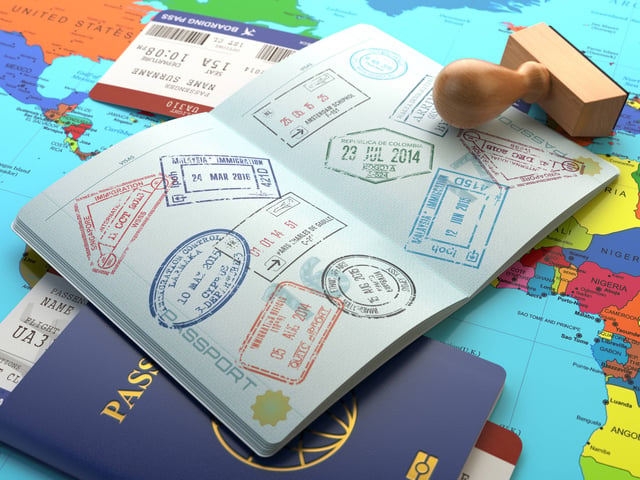Moroccan Transit Visa
Morocco offers vibrant marketplaces and a strong cultural identity, attracting many travellers each year. If your trip involves only passing through the country, understanding the Morocco Transit Visa in advance will help ensure your travel connection and can also allow you to make a short stop in Morocco.
Since the transit visa is not available online, applicants must apply directly at a Moroccan Embassy or Consulate before travelling.

What is a Morocco Transit Visa?
A Morocco Transit Visa is a short-term visa that lets travellers pass through Morocco on their way to another country. This visa is designed for those with a layover in Morocco who want to explore the country briefly or simply need to switch flights.
Is There a Morocco Transit Visa on Arrival?
Morocco does not offer a transit visa-on-arrival option. You must apply at a Moroccan embassy or consulate before you start your journey.
How Long Can You Stay with a Morocco Transit Visa?
The transit visa usually allows a stay of up to 72 hours.
This short timeframe is suitable for:
- Airport transfers
- Overnight layovers
- Brief city visits near major airports
Why Visiting a Moroccan Embassy is Essential
Unlike the Morocco Tourist eVisa or Business eVisa (which can be completed entirely online), the Transit Visarequires in-person processing.
Applicants are required to:
- Submit their documents directly to the Embassy.
- Provide their passport for verification.
- Return for collection once processing is complete.
This step verifies identity and travel intent, but it also means you should apply well in advance of your trip to avoid delays.
Morocco Transit Visa Requirements
A Valid Passport
With 2 blank visa pages, your passport must remain valid throughout your trip to Morocco.
Passport-Sized Photographs
Provide a very recent photo of yourself with a white background.
Visa for Final Destination
A copy of the visa for the country you will be travelling to after Morocco is to be submitted.
Proof of Residence
Provide a document, such as an identity card or a residence permit, to confirm your address.
Flight Tickets
Submit copies of your flight tickets showing that you transit through Morocco.
Accommodation Proof
If your layover is long, provide proof of accommodation for your entry to Morocco.
Visa Fee Payment
Payment of Transit visa fees is completed at the respective embassy or consulate.
Important Notice: To avoid delays or rejections, ensure that all documents correspond accurately.
How to Apply for a Morocco Transit Visa (Embassy and Consulate)?

- Locate the nearest Moroccan Embassy or Consulate.
- Schedule an appointment if required in your region.
- Submit your documents in person.
- Pay the visa fee.
- Return to collect your passport once notified.
Morocco Transit Visa Fee
The fee for a Moroccan transit visa can vary depending on the embassy through which you’re applying, as well as other factors.
Processing Time for a Morocco Transit Visa
A Moroccan transit visa can be obtained within 3 - 6 Days, though processing may take longer due to embassy workload.
Extending Your Stay in Morocco
A transit visa cannot typically be extended or converted into a tourist visa. If you decide to stay longer, you will need to exit Morocco and apply for a new visa or an eVisa.
Why the Tourist eVisa May Be a Better Choice
If your travel plans involve spending more than a short period in Morocco, stepping outside the airport transit area, or avoiding repeated visits to an embassy, the Morocco Tourist eVisa may be more suitable.
The Transit Visa typically requires in-person embassy appointments, physical document submissions, and variable approval timelines. In comparison, the Tourist eVisa offers a more practical approach for travellers who prefer a direct online process.
Key Points of the Morocco Tourist eVisa
- The application is completed fully online.
- No in-person visits to an embassy are required.
- It suits travellers with flexible or uncertain layover durations.
- Approval may be issued within 1 - 2 Days.
- It allows sufficient time to move freely and explore Morocco during transit.
- The overall cost is generally lower than applying for a transit visa.
- You may leave the airport and explore Morocco without restriction during your permitted stay.
The Tourist eVisa provides a straightforward way to manage transit with flexibility, time, and ease of movement.
Common Mistakes When Applying for A Morocco Transit Visa
A Moroccan transit visa may be rejected due to errors in your documents, incomplete application forms, conflicting background-check results, insufficient financial proof, security concerns, or prior visa abuse. Contact the correct embassy or consulate to clarify your situation.
FAQs
Yes, a transit visa allows you to leave the airport for up to 72 hours, which is enough time for a short visit. If your layover is long enough, you can explore central Marrakech, visit the Medina, or enjoy a meal at a local café.
If a delay keeps you beyond the permitted period, contact the airline or the nearest immigration office immediately. Exceeding the transit visa limit may result in penalties, so it is vital to report the situation and follow official guidance.
No. Transit visas cannot be extended. If you wish to stay longer, you will need to apply for a Morocco Tourist eVisa before your trip.


